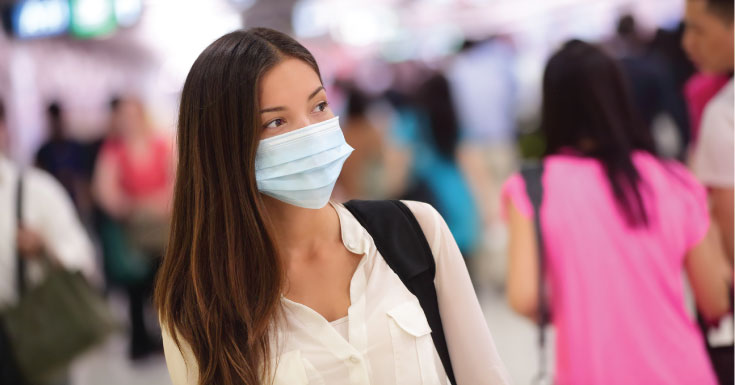Coronaviruses are a large family of viruses found in both animals and humans. Some infect people and are known to cause illness ranging from the common cold to more severe diseases such as Middle East Respiratory Syndrome (MERS) and Severe Acute Respiratory Syndrome (SARS).
A current coronavirus (CoV) is a new strain of coronavirus that has not been previously identified in humans. The new, or “novel” coronavirus, now called 2019-nCoV, had not previously been detected before the outbreak was reported in Wuhan, China in December 2019.
What are the early signs if someone is infected with the Coronavirus?
The most serious complications will be pneumonia and respiratory distress. Older people, especially those with respiratory issues, diabetes and heart-related issues are more vulnerable.
What are the notable signs if someone is infected with the Coronavirus?
The new coronavirus is a respiratory virus which spreads primarily through contact with an infected person through respiratory droplets generated when a person, for example, coughs or sneezes, or through droplets of saliva or discharge from the nose.
What can the public do to prevent or help curb Coronavirus from spreading?
Stay aware of the latest information on the outbreak, available on WHO website, and take care of your health by doing the following:
- Wash your hands frequently with an alcohol-based hand rub or soap and water. Why? Washing your hands with an alcohol-based hand rub or soap and water kills the virus if it is on your hands.
- Maintain social distancing – maintain at least 1 metre (3 feet) distance between yourself and other people, particularly those who are coughing, sneezing and have a fever. This is because if someone who is infected with a respiratory disease, like 2019-nCoV, coughs or sneezes they project small droplets containing the virus. If you are too close, you can breathe in the virus.
- Avoid touching eyes, nose and mouth, because your hands touch many surfaces which can be contaminated with the virus. If you touch your eyes, nose or mouth with your contaminated hands, you can transfer the virus from the surface to yourself.
Looking at how prevention is the best saviour, what are the recommended safety measures? Also, what type of facemask is suitable since there are many different types that offer different usage?
Wearing a medical mask can help limit the spread of some respiratory disease. However, using a mask alone is not guaranteed to stop infections and should be combined with other prevention measures including hand and respiratory hygiene and avoiding close contact – keeping at least 1 metre (3 feet) distance between yourself and other people.
For now wearing a 3ply surgical mask is sufficient except for health care workers who need more sophisticated masks (example N95) and face shields in addition to the donning of other protective equipment as they are in close contact with suspected cases. You are advised to wear the face mask correctly – you can always check out YouTube as there videos that show the correct way to use these masks.
What does treatment of the Coronavirus entail, and how effective is it so far?
To date, there is no specific medicine recommended to prevent or treat the novel coronavirus. However, those infected with 2019-nCoV should receive appropriate care to relieve and treat symptoms, and those with severe illness should receive optimized supportive care. Some specific treatments are under investigation and will be tested through clinical trials.
In your opinion, how long will this virus wreak havoc before it slows down or ends?
It is indeed difficult to estimate how long this will wreak havoc. But with the measures taken by China and the other countries, hopefully it will be for a period of up to two months. But then again all this requires coordinated and strict enforcement of the existing measures in place.
Important take home points shared by Dr. B. Rajasingam
- Wash your hands frequently
- Practice respiratory hygiene
- Maintain social distancing
- Avoid touching eyes, nose and mouth
- If you have fever, cough and difficulty breathing, seek medical care early
- As a general precaution, practice general hygiene measures when visiting live animal markets, wet markets or animal product markets
- Avoid consumption of raw or undercooked animal products
WE MUST ALWAYS STAY VIGILANT AT ALL TIMES AND NOT JUST WHEN OUTBREAKS TAKES PLACE. COMPLACENCY IS THE BIGGEST THREAT.

Head of Department, Accident & Emergency Department,
Malaysian Operation Division, Gleneagles Kuala Lumpur (GKL)
















